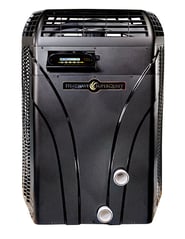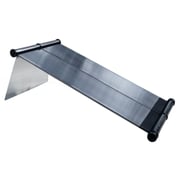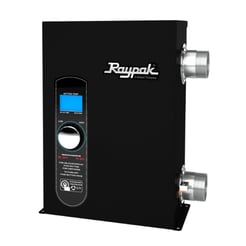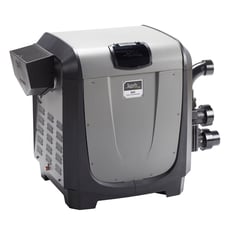After water leaves the pool via the skimmers, passes through the pump, then through the filter, the next big equipment item plumbed into many pool systems is the heater. Some homeowners opt to keep their system simple, immediately returning the water back to the pool after passing through the filter. Heaters and heat pumps are on the rise however, especially in the northern United States and Canada. Places like Arizona and Florida where pool seasons last longer and the climate is warmer don’t often utilize heating elements in their pool. But here in Connecticut and the rest of the North-East, we only experience about 6 months of swimmable weather, and those 6 months sometimes get shortened due to unpredictable weather patterns. All that to say, heaters can be a game changer, and give you a greater return on investment by lengthening your swim season and making it more enjoyable.
There are four primary types of heaters: Gas/propane, electric, solar, and heat pump.
Heat pumps are equipped with a fan that draws air into the pump through the evaporator coil (essentially a grid panel on the side of the heat pump). In that evaporator coil is a liquid refrigerant, which draws the heat out of the air as it passes through the coil. As the heat joins the refrigerant, the liquid changes to a heated gas, and that is pumped into a compressor. In the compressor the heated gas becomes even hotter before being pushed into the heat exchanger condenser. In this condenser, the heat is transferred from the gas to the pool water in the adjacent piping. The gas, stripped of heat, once again becomes a liquid refrigerant, and it is pumped back to the evaporator coil where the cycle starts all over again.

Solar heaters are appealing to many homeowners due to increased public awareness of both environmental benefits and rising energy costs. However, while solar is a great long-term method to reducing cost, it can take a number of years to recoup what you invest in the initial system setup. The solar panels are full of piping through which flows either water or antifreeze. As the collectors (the panels and piping) absorb the sun’s heat, the pool water will heat up and be pumped back through the system into the pool. If you are in a colder climate and use antifreeze in your solar panel piping, a heat exchanger that is plumbed between the heater and the pool helps transfer heat from the antifreeze to the pool water.

Electric heaters have a longer heat-up time, and use a lot of energy. They are ideal for small pools, hot tubs, and indoor pools or spas where you can’t always use a gas or propane heater. Consider also that indoor pools are less likely to loose a lot of heat. Given the electric heater’s long heat up time, the contained indoor temperature will help with the overall temperature maintenance of the pool. Electric heaters heat the water via an electric coil that is immersed in the water that flows through the heater. All electric heaters should be covered by a rain resistant cover, and installed with a ground fault circuit interrupter. Although the heat-up time is long, and the expense can be driven up as a result of heat loss, electric heaters are considered 100% efficient since 100% of the heat they produce goes into the water.

Gas heaters, on the other hand, are 80% efficient, as 20% of the heat they produce never reaches the water. This 20% can escape with flue gases. The overall temperature of the pool water will rise higher, faster with a gas or propane heater. Many heater manufacturers are producing rodent-proof models. No more can little creatures chew their way through your heater in search of a warm place to sleep and raise their brood!

As with any aspect of your pool, there are different variables to consider when you are thinking about purchasing a new pool heater. If you’re at a loss where to begin, consider your budget and your needs. If you only use the pool occasionally, you may want a heater that has a quick heat up time. If you like being able to use the pool whenever you want, you may want a heater that has efficient temperature maintenance. Consider also the environment of your pool, if it is indoor, under shade, receives full sun, or experiences regular and heavy wind velocity. With a clear idea of what you want and what you need, it will be easier to narrow down what heater best fits that vision.